

Collecting and acting on student feedback. ‘At no point is any journey embarked upon with a full staff approach a linear one.
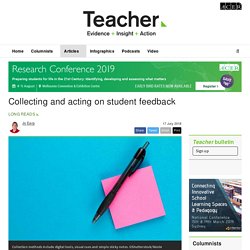
Instead all members of staff start at a different place, and the journey itself often has loops and twists and completely starting over.’ Philippa Mulqueen, a teaching and learning coach who helps lead professional learning at Pakuranga College in New Zealand, adds that ‘nothing worth doing should be so easy to implement that it just happens seamlessly’. The Specialist Classroom Teacher (SCT) is reflecting on the implementation of a school-wide focus on effective use of student voice. Feedback to support lifelong learning. Research has identified teacher feedback as a significant influence on student achievement in the classroom (Hattie, 2008).
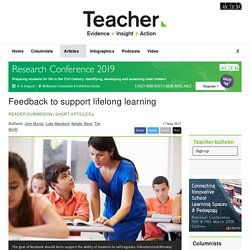
In an effort to maximise academic growth, teachers have been encouraged to provide more feedback to their students. However, not all feedback is equal. If one of the goals of education is to create lifelong learners, how can teachers utilise feedback to promote this outcome? Lifelong learners are intrinsically motivated to build on their existing knowledge. According to neuroscience-based theories of attention and learning, people are not passive recipients of information, but wired to test and predict where new information fits (Friston, 2010).
Feedback – The Second Draft. Terms 2 and 3 were simply horrendous for me.
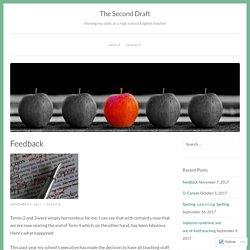
I can say that with certainty now that we are now nearing the end of Term 4 which, on the other hand, has been fabulous. Here’s what happened: This past year my school’s executive has made the decision to have all teaching staff (K-12) focus on a couple of key areas. We help great education practice become common practice. Tanya As global evidence shows, feedback has a significant impact on learning, contributing a gain of as much as eight months’ worth of learning progress in a year when implemented well (Education Endowment Foundation, 2017).
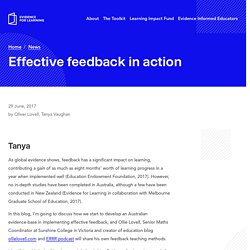
However, no in-depth studies have been completed in Australia, although a few have been conducted in New Zealand (Evidence for Learning in collaboration with Melbourne Graduate School of Education, 2017). In this blog, I’m going to discuss how we start to develop an Australian evidence-base in implementing effective feedback, and Ollie Lovell, Senior Maths Coordinator at Sunshine College in Victoria and creator of education blog ollielovell.com and ERRR podcast will share his own feedback teaching methods.
Identifying this lack of local research helped drive Evidence for Learning to ask the question. If Grades don't Advance Learning, Why Do We Give Them? Posted by Bill Ferriter on Friday, 09/18/2015 Warning: I'm more than a little grouchy today.
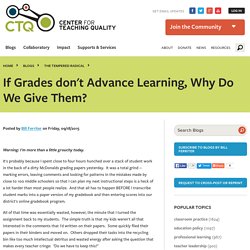
Hacking Feedback: The Bookends. This is part one of a three-part series by Sean on reforming feedback.
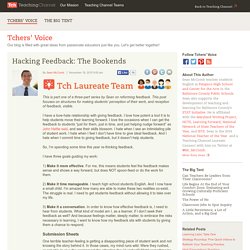
This post focuses on structures for making students’ perception of their work, and reception of feedback, visible. I have a love-hate relationship with giving feedback. I love how potent a tool it is to help students move their learning forward. I love the occasions when I can get the feedback to students “just for them, just in time, and just helping nudge forward” as John Hattie said, and see their skills blossom. I hate when I see an intimidating pile of student work. How To Give Students Specific Feedback That Actually Helps Them Learn. How To Give Students Specific Feedback That Actually Helps Them Learn.
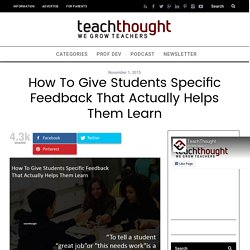
How To Give Students Specific Feedback That Actually Helps Them Learn. How To Give Students Specific Feedback That Actually Helps Them Learn.
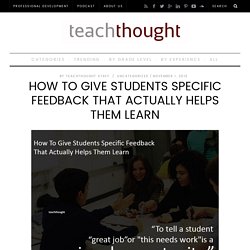
7 Key Characteristics Of Better Learning Feedback. 7 Key Characteristics Of Better Learning Feedback by Grant Wiggins, Authentic Education On May 26, 2015, Grant Wiggins passed away. The 80/20 Rule: Maximize Your Potential in Less Time. What makes the biggest difference in your teaching?

If you hop online to the places where teachers hang out and ask that question, you will hear a bevy of answers. It only begets more questions. Why Questions Are More Important Than Answers. Why Questions Are More Important Than Answers by Terry Heick Clocks and old watches are miracles.
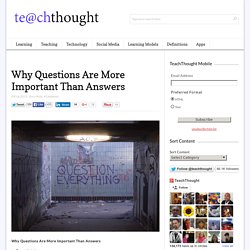
If you’ve ever taken one apart and had a look at the intricate gears with their jutting teeth reaching out with just the right math to tick in rhythm with the pulse of the universe, you’ll see that whatever mind conjured the thing and all its parts is mad. Imagine the dogged pursuit of a proper clock-maker, day after day bound up in design and measurement and function and orderly thinking, forcing exactitude on little bits of metal that never asked for it. And then finally getting it right–so many decisions and matters of design suddenly set the clock off ticking forever. Edutopia. Ramsey Musallam’s TED Talk on his "3 Rules to Spark Learning" inspires the need to foster students' curiosity. As educators, we want them to ask questions and explore their ideas, which can lead to a rich inquiry-based classroom.
From young children whose mantra for everything is "Why? " to teens that require effective inquiry skills as part of their preparation for successful post-secondary life, this need is high. But our challenge is where to begin. Here are four protocols to help jump-start a culture of fostering student inquiry that, in turn, fosters questions and ideas. 1. Formatively Assess The Understanding Of Fractions.
Creating Essential Questions. Essential Questions created by Pat Clifford and Sharon Friesen Essential Questions develop foundational understandings. They provide the fundamental organizing principles that bound an inquiry and guide the development of meaningful, authentic tasks. Essential questions have several key components: They arise from people’s attempts, throughout human history, to learn more about the world(s) we live in. Edutopia. What is qualitative formative assessment? Some call it anecdotal or informal assessment. However, such designations imply passivity -- as if certain things were captured accidentally.
I believe the word "formative" should always be included with the word assessment because all feedback mechanisms should help shape and improve the person (or situation) being assessed. Wedging the word "qualitative" into my terminology differentiates it from the analytic or survey-based measures that some associate with the term formative assessment. For my purposes, qualitative formative assessment is the ongoing awareness, understanding, and support of learning that is difficult or impossible to quantify. Carly Schuler stated that the learner needs to be mobile, not the technology. 8 Strategies To Help Students Ask Great Questions. 8 Strategies To Help Students Ask Great Questions by Terry Heick Questions can be extraordinary learning tools.
A good question can open minds, shift paradigms, and force the uncomfortable but transformational cognitive dissonance that can help create thinkers. In education, we tend to value a student’s ability to answer our questions. But what might be more important is their ability to ask their own great questions–and more critically, their willingness to do so. The latter is a topic for another day, but the former is why we’re here. 1.
A Quick Guide To Questioning In The Classroom. A Guide to Questioning in the Classroom. Misunderstanding The Gradual Release Of Responsibility Framework. Misunderstanding The Gradual Release Of Responsibility Framework by Grant Wiggins, Authentic Education Yes, reading strategies–and explicit teaching of them–make a considerable difference, as my previous four blog posts here, here, here, and here make clear. The A-B-Cs of Giving Feedback to a Colleague. Providing feedback. Edutopia. I thought I could read my students' body language. 60 Non-Threatening Formative Assessment Techniques. 60 Non-Threatening Formative Assessment Techniques by TeachThought Staff.
10 Smart Tools For Digital Exit Slips. Can we change the PD culture of communication? Student Feedback: Six Questions for Teachers. 7 Effective Templates For Teacher Feedback. Feedback in the classroom is often one-sided: the teacher gives feedback and the student receives it, generally relating to the quality of their work. Depending on the level of the students you teach, you may find yourself subject to student evaluation, but generally that only comes once a semester (at least at the university level), and generally when the course is completed and grades are either done or almost done. 5 Ways to Help Your Students Become Better Questioners. The humble question is an indispensable tool: the spade that helps us dig for truth, or the flashlight that illuminates surrounding darkness. Questioning helps us learn, explore the unknown, and adapt to change. 5 Powerful Questions Teachers Can Ask Students.
My first year teaching a literacy coach came to observe my classroom. After the students left, she commented on how I asked the whole class a question, would wait just a few seconds, and then answer it myself. 7 Things To Remember About Classroom Feedback. Dylan wiliam presentation. ASTE2013FormativeAssessmentandStudentMotivation_Paper. Assessment for learning: are you using it effectively in your classroom? SmartBlog on Education - Are grades the problem, or is it our approach? - SmartBrief, Inc. SmartBlogs SmartBlogs.
The 7 Most (And Least) Effective Ways To Improve Student Achievement.